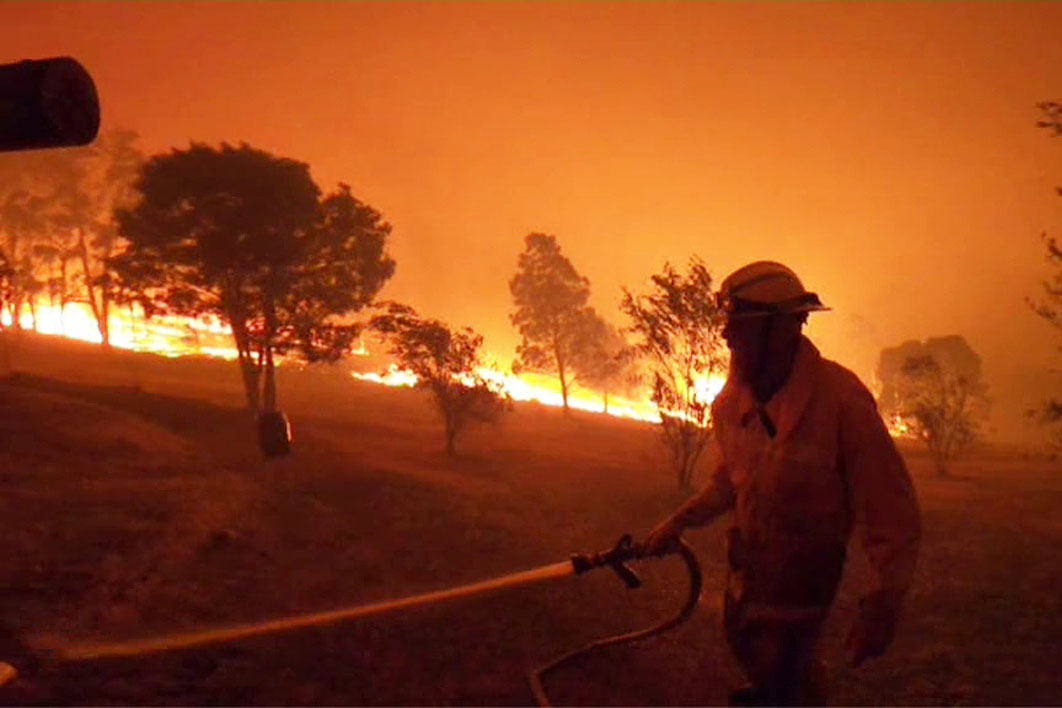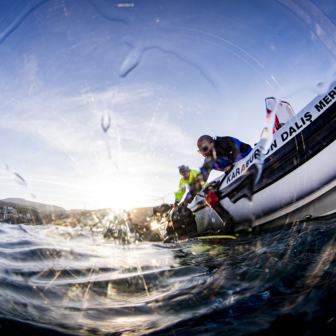The start of the political year on ABC television brings changes at the helm, with David Speers taking over as host of Insiders and Hamish Macdonald in the chair on Q&A. It’s “a new year and a new political landscape,” announces Speers. For Macdonald, who was caught up in the fires on holiday in Bega, the new politics is defined by the burning landscapes he saw around him.
Speers departed from the informal style of his distinguished predecessor Barrie Cassidy, making his debut in a sharp suit, commencing with a longer monologue to camera, and offering some explicitly judgemental commentary in place of Cassidy’s sly irony. Perhaps we are beyond irony in this new landscape. Adjudication is part of the job of political journalists, and when things get seriously rocky, the pressure is on to show their hand and reveal where they draw the line on matters of principle rather than simply scoring the key players on how successfully they manage the narrative.
If there was some prevarication in Speers’s opening remarks, it was more than compensated for by the brilliantly incisive video montage that preceded them. It’s hard to know whom to credit for these sequences, but the pace of the cross-cutting and the killer instinct for juxtaposition did more to expose deceit, hypocrisy and incompetence than any verbal commentary.
The panel discussion, featuring veteran insiders Niki Savva and Phillip Coorey with newcomer Renee Viellaris (political editor of the Brisbane Courier Mail), led off with the bushfire crisis. Savva was not mincing words. The PM’s Hawaiian holiday was a big mistake, she said. Coorey agreed. A mistake compounded by the attempted cover-up. “They lied about it,” said Savva. It was Viellaris who sought to fudge the issue, suggesting that the real problem was an ineffectual deputy.
Underlying the task of adjudication is the fundamental distinction between political issues and matters of government. Politics is a game of perceptions; government is consequential. A good commentator should never confuse those registers.
Here it was Savva who stood out, refusing at every point to revert to a merely political view of what had transpired by focusing, laser-like, on how Morrison’s essential failure has been his incapacity to act and think like a head of government. An attempt to rescue his image with a party-political ad, she said, was revealing in precisely the wrong way. “The last thing people needed at that stage,” she said, “was a reminder that his driving instincts are political instincts.”
Speers is less firm on where political instincts need to be called out. He deserves his accolades as an interviewer, but the interview with treasurer Josh Frydenberg on Sunday was a mixed bag.
Starting off in low gear with questions about the evacuation and quarantine of citizens caught up in Wuhan, Speers almost immediately steered into a gotcha moment of some significance. What about the plan to charge them $1000 each for the flight to Christmas Island, he asked. “Why do you have to do that?” “Well, we’re not,” was the stark response. Frydenberg was here contradicting a statement by the prime minister that Peter Dutton had reiterated that very morning. The Department of Foreign Affairs, Frydenberg said, had given the wrong advice. This was surely a major embarrassment for the government, especially since Morrison had explicitly pronounced that this was the standard rule.
At this point many interviewers would have gone in for the kill, but that is not Speers’s style. He has a very effective way of increasing the speed of questioning without raising the intensity, especially as his quickfire comebacks are based on meticulous command of the relevant facts and figures.
On the topic of sports rorts, though, he missed an opportunity to push home the case for the prosecution. “Do you admit the government used taxpayers’ money for blatant pork-barrelling?” sounds like a confronting question, but the choice of words actually let Frydenberg off the hook. This was so much more than the traditional political game of pork-barrelling, with its folksy connotations. It was something planned and executed in knowing contravention of due process, a matter of government, not politics, and of behaviour that dangerously tests the boundaries on ministerial — and prime ministerial — integrity. As Coorey put it, it was at the least “an abuse of ministerial discretionary powers.”
Insiders looks set to continue its strong track record. When it risked degenerating into a coffee morning for sparring political umpires, Cassidy always managed to get it back on track, building a cohort of serious-minded journalists who know the importance of holding government to account. With these stalwarts to depend on, Speers brings pace and agility, and his own form of authority. The succession plan, it seems, is working out well.
The following night, Four Corners and Q&A presented coordinated perspectives on the bushfire crisis, both introduced by Hamish Macdonald. In place of Four Corners’s trademark style, the inferno was documented by citizens caught in its path. They reported in conditions so terrifying and perilous no professional journalist, however intrepid, would have been authorised to venture into them. Some of those caught up, though — like Macdonald — were journalists who continued to front the camera without any assurance that they would find a way out.
On the Gold Coast hinterland in September, the Northern Rivers region of New South Wales in November, Gospers Mountain and the Adelaide Hills in December, East Gippsland and the NSW south coast as the new year turned, and Kangaroo Island in January, the catastrophe unfolded. The images recurred: a chopper against an amber sky, silhouettes of firefighters dwarfed by seventy-metre flames, vehicles moving through ember attacks so dense that the surrounding environment looked like molten lava. The colours of the natural world were gone, sucked into blackness and then erupting in bursts of crimson and fluorescent orange.
People spoke of the fires as if they were a motivated enemy force, attacking with ever greater fury and vindictiveness. Just to watch it all was an ordeal. We were blitzed with every mythological human nightmare: the fire-breathing dragon towering over some tiny human adversary, the great snake working its way across the landscape. It was darkness at noon, the inferno, the apocalypse. But it is happening now.
The immediacy was like nothing else I have seen on television. As a fire truck is engulfed in bushland south of Nowra, the driver continues to report over the radio. The crew speak to each other in steady voices, focused on the practicalities. A father and daughter experience the full onslaught of the fire front as they defend their home with ordinary hoses. People survive because they are quick-thinking, collaborative and disciplined.
But now, in the aftermath, those same people are in need. Many will suffer traumatic recall, and are faced with intolerable ongoing stresses. Homes and businesses have to be rebuilt, stock must be fed, fences replaced, injured animals tended. Where are the resources, and how are they to be channelled most swiftly and effectively? That was the overriding question for the studio audience of Q&A, assembled in Queanbeyan from the fire-ravaged towns of the NSW south coast and northeastern Victoria.
Practicalities were to the fore. Panellists Kristy McBain, mayor of Bega Valley, and Cheryl McCarthy of Surf Life Saving NSW have been on the front line, working to provide safe refuges and essential resources to evacuated communities. Both have exercised exemplary leadership. They understand how survival depends on responsibility, cooperation and generosity, and that was the spirit in which they responded to a succession of urgent questions about what happens next.
But Macdonald, in the chair, wanted to go beyond the practicalities, to generate “a big conversation” about causes and consequences. That meant talking about climate change. Here Michael Mann, billed as a “renowned US climate scientist,” faced off against Liberal senator Jim Molan. In one exchange that immediately went viral, Molan said his mind was open, and Mann quipped back that it was good to keep an open mind, but not so open that your brain falls out. With almost the entire studio audience now audibly hostile to Molan, Macdonald intervened to point out that his views were representative of a recently re-elected government and therefore reflected widespread public opinion.
It was a significant moment — not because the exchange between the senator and the climate scientist mattered, but because it did not. We learned nothing from Mann, who didn’t even explain what he was an expert in, and less from Molan, who was very good at hogging the airwaves but had done no new thinking in response to the catastrophe. Why were they on the program at all? This is a serious question for the producers. If Q&A is losing audience, it is because so many people have lost all tolerance for the “both sides of politics” convention in public discussion.
More time needed to be spent with those on the panel who had something substantive to offer, like Indigenous fire practitioner Victor Steffensen, who left us in no doubt about what he knew and how. For twenty years or more, he said, elders had been talking about changing conditions. We need to listen to those who are trained to read landscapes, who understand the soil and how to reduce fuel in the right ecosystems at the right time. Introduced vegetation has changed the flammable potential of ecosystems. “What would you say to the authorities about what we could do ahead of next summer?” asked Macdonald. “I would say jump in the passenger seat and let us do the driving,” Steffensen responded, without missing a beat.
A truly big conversation can only happen if everyone in it knows when not to speak, and can give the floor to someone who really has something to say. Just as Four Corners showed how these fires are so much greater than the human scale, Steffensen was showing how we must enlarge our thinking to meet the emergencies we face.
People don’t come through those emergencies unchanged, and part of the change is a fundamental shift in priorities and perspectives. Andrew Constance, Liberal MP for Bega, contributed to the discussion not as the representative of a political agenda but as someone who had been brought to the limits of his own abilities. Constance is calling for an embargo on political wrangling over the causes of the fires and a focus on community-generated response strategies. His is the kind of voice we need on Q&A if it is to have a future.
Macdonald is a dynamic and original figure, one of the most promising talents in contemporary Australian media. There could not be a better choice of host for the program, but please, can we dispense with business as usual in the choice of panel members? •




